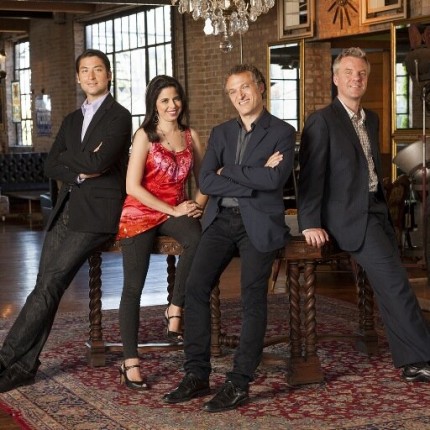Pacifica Quartet and friends close UC Presents’ WW I series on high note

The Pacifica Quartet’s Sunday afternoon performance at the Reva and David Logan Center for the Arts marked the end of the University of Chicago’s “Crossroads” series dedicated to the music of World War I. It also closed the quartet’s performances at the university for the 2014-2015 season.
To open the concert, clarinetist Michael J. Maccaferri and pianist Anna Polonsky joined the Pacifica Quartet in a performance of Sergei Prokofiev’s Overture on Hebrew Themes. In playing a classical work derived from folk material, there is always the question of how much to play up the music’s folkish origins versus its classical dressing. In this performance, Maccaferri phrased his solos playfully, and the ensemble as a whole was sensitive to the piece’s many shifts between exuberance and melancholia. But the playing generally felt more refined than gutsy, staying firmly within the concert hall, and never venturing into the shtetl inn.
Large swathes of Bela Bartok’s String Quartet No. 2 are constructed out of small motivic cells that are passed between the four players, often in overlapping succession. The Pacifica Quartet carefully stage-managed their dynamics, so that each player was clearly audible when he or she “spoke” a new iteration of a motive. And the sheer physicality with which the quartet dug into each gesture made these entrances visible as well as audible: one could track the distinctive bowing shape of each motive as it rippled its way among the players.
The precision of interplay was a constant throughout the piece, but the character of the playing was tremendously varied. If one listened only to the way the players phrased the first movement and not to the dissonance of the harmonies, one might have thought that this was late 19th-century music, so warm was their tone. Even the loudest, most jagged passages sounded expressively songlike rather than motoric or percussive.
Motoric and percussive are certainly the words for their acerbic rendition of the opening of the second movement. Their playing became tender in the movement’s central tranquillo section, and positively ghostly in the prestissimo coda, which they peppered with accents even at their breakneck tempo, all while maintaining the required eerie hush. In the finale, Bartok asks for some sections to be played with mutes, and some without. The Pacifica Quartet’s frigid sound in the muted sections and fuller tone in the unmuted sections made this contrast especially palpable.
For the second half of the program, pianist Orion Weiss joined the Pacifica Quartet for Edward Elgar’s Piano Quintet. The players milked every ounce of mystery out of all of the opening’s dynamic twists. But their rendering of the espressivo second theme of the introduction was surprisingly straightforward, even during its reappearances, as it interrupts the allegro of the first movement and opens the finale. Highlights of this movement included the spring that Weiss brought to the piano part—belying the thickness of Elgar’s piano writing—and the delicacy and charm that all the players brought to Elgar’s Spanish-sounding second subject, when it reappeared in the recapitulation.
Violist Masumi Per Rostad played the solo that opens the second movement with much lyrical beauty. The ensemble performance of this entire movement was notable for its emotional generosity, refuting any lingering reputation of Edwardian stuffiness in Elgar’s music. The movement’s attempt to revive a bygone Romantic spirit was a successful act of resurrection in their interpretation.
A connection to the past was also present in the finest moment in their interpretation of the finale. During the development, a lush melody from the second subject of the first movement makes a surprise return. The performers brought a wistful quality to the theme’s reprise, as if clouded by the effort of remembrance, an effective sentiment with which to close the “Crossroads” series.
Posted in Uncategorized


